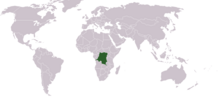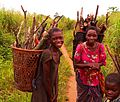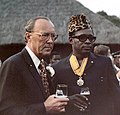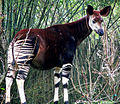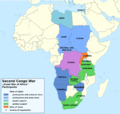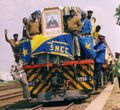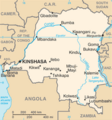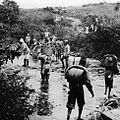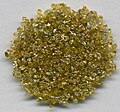Portal:Democratic Republic of the Congo
The Democratic Republic of the Congo Portal
The Democratic Republic of the Congo (DRC), also known as DR Congo, Congo-Kinshasa, or simply Congo, is a country in Central Africa. By land area the country is the second-largest country in Africa and the 11th-largest in the world. With a population of around 110 million, the Democratic Republic of the Congo is the most populous Francophone country in the world. The national capital and largest city is Kinshasa, which is also the economic center. The country is bordered by the Republic of the Congo, Central African Republic, South Sudan, Uganda, Rwanda, Burundi, Tanzania (across Lake Tanganyika), Zambia, Angola, the Cabinda exclave of Angola, and the South Atlantic Ocean. Centered on the Congo Basin, the territory of the Congo was first inhabited by Central African foragers around 90,000 years ago and was settled in the Bantu expansion about 3000 to 2000 years ago. In the west, the Kingdom of Kongo ruled around the mouth of the Congo River from the 14th to 19th centuries. In the center and east, the empires of Mwene Muji, Luba, and Lunda ruled from the 15th, 16th, and 17th centuries to the late 19th and early 20th centuries. King Leopold II of Belgium formally acquired rights to the Congo territory from the colonial nations of Europe in 1885 and declared the land his private property, naming it the Congo Free State. From 1885 to 1908, his colonial military forced the local population to produce rubber and committed widespread atrocities. In 1908, Leopold ceded the territory, which thus became a Belgian colony. Congo achieved independence from Belgium on 30 June 1960 and was immediately confronted by a series of secessionist movements, the assassination of Prime Minister Patrice Lumumba, and the seizure of power by Mobutu Sese Seko in a 1965 coup d'état. Mobutu renamed the country Zaire in 1971 and imposed a harsh personalist dictatorship until his overthrow in 1997 by the First Congo War. The country then had its name changed back and was confronted by the Second Congo War from 1998 to 2003, which resulted in the deaths of 5.4 million people and the assassination of President Laurent-Désiré Kabila. The war ended under President Joseph Kabila, who governed the country from 2001 to 2019 and under whom human rights in the country remained poor and included frequent abuses such as forced disappearances, torture, arbitrary imprisonment and restrictions on civil liberties. Following the 2018 general election, in the country's first peaceful transition of power since independence, Kabila was succeeded as president in a highly contentious election won by Félix Tshisekedi, who has served as president since. Since 2015, eastern Congo has been the site of an ongoing military conflict. The Democratic Republic of the Congo is extremely rich in natural resources but has suffered from political instability, a lack of infrastructure, corruption, and centuries of both commercial and colonial extraction and exploitation, followed by more than 60 years of independence, with little widespread development. Besides the capital Kinshasa, the two next largest cities, Lubumbashi and Mbuji-Mayi, are both mining communities. The DRC's largest export is raw minerals, with China accepting over 50% of its exports in 2019. In 2021, DR Congo's level of human development was ranked 179th out of 191 countries by the Human Development Index and is classed as a least developed country by the UN. As of 2018[update], following two decades of various civil wars and continued internal conflicts, around 600,000 Congolese refugees were still living in neighbouring countries. Two million children risk starvation, and the fighting has displaced 4.5 million people. The country is a member of the United Nations, Non-Aligned Movement, African Union, COMESA, Southern African Development Community, Organisation Internationale de la Francophonie, and Economic Community of Central African States. (Full article...) Selected article - Zaire, officially the Republic of Zaire, was the name of the Democratic Republic of the Congo from 1971 to 18 May 1997. Located in Central Africa, it was, by area, the third-largest country in Africa after Sudan and Algeria, and the 11th-largest country in the world from 1965 to 1997. With a population of over 23 million, Zaire was the most populous Francophone country in Africa. Zaire played a central role during the Cold War. The country was a one-party totalitarian military dictatorship, run by Mobutu Sese Seko and his Popular Movement of the Revolution. Zaire was established following Mobutu's seizure of power in a military coup in 1965, after five years of political upheaval following independence from Belgium known as the Congo Crisis. Zaire had a strongly centralist constitution, and foreign assets were nationalized. The period is sometimes referred to as the Second Congolese Republic. (Full article...) General images -The following are images from various Democratic Republic of the Congo-related articles on Wikipedia.
This is a Good article, an article that meets a core set of high editorial standards.
Barthélemy Mukenge Nsumpi Shabantu (3 August 1925 – 4 July 2018) was a Congolese politician who served as President of Kasaï Province from 11 June 1960 to January 1962 and July to September 1962. He was a president of the Association des Lulua-Frères, a Lulua ethnic syndicate, and a leading member of the Union National Congolaise. Though initially allied with nationalist Patrice Lumumba, he later denounced him and aligned himself with more moderate politicians. Following the division of Kasai Province in late 1962, Mukenge became Minister of Health and Minister of Social Affairs of the new Luluabourg Province. He later served as Governor of Kivu Province and on the Political Bureau of the Mouvement Populaire de la Révolution. He withdrew from politics in 1974 and died in 2018. (Full article...) This is a Featured article, which represents some of the best content on English Wikipedia..
Jason Sendwe (1917 – 19 June 1964) was a Congolese politician and the founder and leader of the General Association of the Baluba of the Katanga (BALUBAKAT) party. He later served as Second Deputy Prime Minister of the Democratic Republic of the Congo (then Republic of the Congo) from August 1961 until January 1963, and as President of the Province of North Katanga from September 1963 until his death, with a brief interruption. Sendwe was born in 1917 in Mwanya, Kabongo Territory, Belgian Congo, to a ethnic Baluba family. He was educated in Methodist schools and nursing institutions. Unable to become a doctor due to a lack of medical schools in the Congo, he found work as a minister, teacher, and nurse. He became involved in several cultural organisations, and in 1957 founded BALUBAKAT to fight for the interests of the Baluba. He espoused Congolese nationalism and believed that the Congo should remain a united country after Belgian rule. In May 1960, shortly before the country's independence, he was elected to the newly constituted Chamber of Deputies. Sendwe sought to obtain control over the government of Katanga Province, but lost to a power struggle against his rival, Moïse Tshombe, and the Confederation of Tribal Associations of Katanga (CONAKAT) party. Regardless, Prime Minister Patrice Lumumba nominated him for the office of State Commissioner for Katanga. (Full article...)
WikiProjectsTopicsCategoriesRelated portalsAssociated WikimediaThe following Wikimedia Foundation sister projects provide more on this subject:
Discover Wikipedia using portals | ||||||



